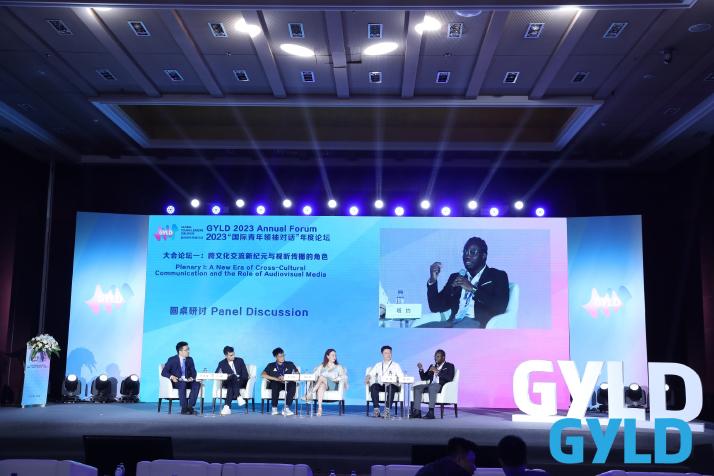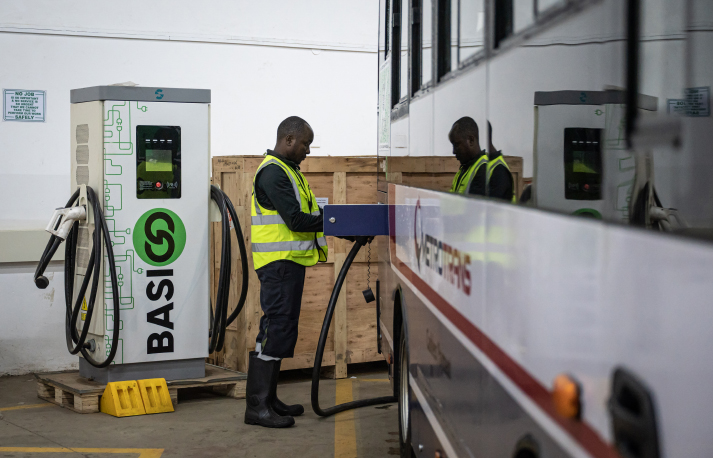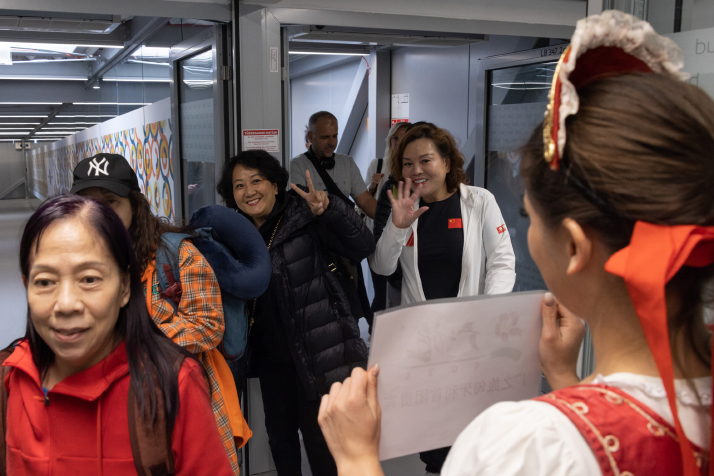| World |
| Expats tell their China stories at youth forum | |
|
|
 Participants from different countries at a panel discussion on cross-cultural communication at the Global Young Leaders Dialogue Forum in Beijing on August 12 (COURTESY PHOTO)
Bora Shnitman, Vice President of Destination Marketing at Beijing-based travel company Dragon Trail International, first got to know China through maps. Interested in geography since his childhood, he found the big country in East Asia mysterious. To satisfy his own curiosity, he decided to visit China. "It was exciting to get to know the country's history and culture, practice writing Chinese characters and discover similarities and differences between China and my country Israel. It was even more exciting to come and visit China after my graduation and to travel around this beautiful country," Shnitman told the Global Young Leaders Dialogue Forum, held in Beijing on August 12. With the theme of Global Development and the Power of Youth, the forum, hosted by the Center for China and Globalization (CCG), drew the participation of around 150 international experts, entrepreneurs, and representatives of international organizations from nearly 30 countries and regions. Their dialogues covered cross-cultural communication, urban development and climate change. For Shnitman, China is not an entirely strange place. "Jewish and Chinese people have quite a few things in common. Both people have a long history and traditional cultural values, and we also actually share some modern similarities. Both Israelis and Chinese like to travel a lot," he said. According to Shnitman, travel is a tool to understand the world. He has been working in tourism and culture industries for more than 15 years now. For him, a major aim of his work is to help to narrow the gap between China and other countries, to introduce Chinese heritage to partners overseas, and to communicate foreign cultural values to the audience in China. Many expats attending the forum have experience and aims similar to Shnitman's. As they explore China, they are witnessing its changes and growing with the country. Improving ties During his work, Shnitman has found that many Chinese want to visit Israel and learn about its history and innovation. "Both governments have made efforts to create favorable visa policies, opened direct flights, and showed willingness to connect," Shnitman said. On August 10, China resumed group tours to Israel. "The COVID-19 pandemic brought many challenges to our lives. This year, we have an opportunity not only to reestablish this connection, but also to make it stronger, to knock aside the differences and to build upon our similarities. We need to leverage the human and technological resources we have to create better connections," Shnitman said. During the forum, Adegboyega Ayodeji Temitayo, a business documentary producer and host of the OUT EAST podcast, also shared the story of his connection to China. The Nigerian native is now based in Shanghai. "When I told my families I'm going to China, they said 'what?' They had no idea of this country. They were not able to see what the people are like, what the food is like, and what the society looks like in China," he said. After coming to China, Temitayo started sharing stories of China to overseas audiences, and tell people in China about other countries. His aim is to create an emotional connection with global audiences through documentaries. Koen Smeets, a Dutch scholar at the Yenching Academy of Peking University, was among the very first foreign students to return to China to study after the impacts of the pandemic began to wane last year. The academy, located in Beijing, aims to build bridges between China and the rest of the world through an interdisciplinary master's program in China studies. His research covers historical and contemporary China-U.S. relations and technologies. "Throughout my past year in China, I've learned to experience for myself the differences between cities, such as Beijing, Shanghai and Chengdu [in Sichuan Province]," Smeets said. At the forum, he shared his experience of taking the high-speed railway from Hong Kong to Beijing, and making orders on China's delivery platforms, which allowed him to learn more about different aspects of China's modernization. Smeets thinks China-U.S. educational programs and exchanges are underfunded, and were rapidly cut due to the pandemic and the tense relations between the two countries. "It's key that we continue these exchanges," he said.  A staff member of BasiGo, a Kenyan electric bus company, recharges a bus in Nairobi on June 2. The company has partnered with Chinese new-energy vehicle giant BYD to assemble electric buses locally (XINHUA)
Growing with China China is becoming a hub of entrepreneurship for global talent. Wahed Ahmadzai, Secretary General of the Alumni Talent Alliance (ATA), addressed the forum, saying there are a lot of foreign entrepreneurs in China and they play a very important role in building bridges between China and other countries. The Afghan national has founded and led the ATA, a nonprofit organization focusing on connecting communities and providing entrepreneurship and career support for foreigners in Beijing. "Their cultural understanding usually leads to not only better relationships between these countries and China, but also creating economic value," Ahmadzai said. Olesia Ermakova, Curator of SCOLAR Network Beijing Hub, is a Russian who has been engaging in organizing activities for around seven years to bring together youth from various countries, through joint projects in the fields of education, entrepreneurship and culture. According to her, global entrepreneurs have been attracted by the business environment in Beijing, but the city also needs to attract more international talents. It is further embracing global professionals by introducing preferential policies, such as accelerating the issuing of visas. A survey by the China Council for the Promotion of International Trade of nearly 800 foreign-funded enterprises in China, conducted in the second quarter of this year, showed that nearly 70 percent of the enterprises are upbeat about China's market prospects in the next five years, and over 80 percent of them expect level or higher returns from investment in China. According to the survey, businesses believe technological innovation, the opening up of China's central and western regions and the digital economy have provided great opportunities. A total of 23,536 new foreign-funded firms were established in China in the first half of this year, up 35.7 percent year on year, according to the Ministry of Commerce. There are also expats involved in China's social growth. Shuhei Aoyama, the Japanese cofounder of Beijing-based B.L.U.E. Architecture Studio has engaged in the design and restoration of buildings in China, especially buildings in hutongs, which are the traditional alleyways in Beijing. As a resident of Beijing's hutong areas for around a decade, Aoyama has renovated several houses there to make them more comfortable for young people. "Young people's new and open lifestyles are changing traditional urban living modes," he said. Joshua Dominick, a cofounder and organizer of Krankin'thru China, has been living in Beijing for 20 years. In 2013, he and Domonic Corradin, both from the United States, launched the program to help injured or disabled people try handcycling, a kind of adaptive cycling for people with lower-limb disabilities. "We focus on young people becoming disabled due to accidents. In China, there is still not much experience in or policies for taking care of these people, and I want to ensure that they have the channel to address problems they face and continue to make contributions," Dominick said. Over the years, he has seen how Beijing has changed into a more open and embracing city. As he noted at the forum, many communities in Beijing have made international people coming and settling down feel welcome. He has also seen Beijing become more accessible to persons with disabilities than it was a decade ago, with changes including subways now being equipped with accessible restrooms and elevators.  Chinese tourists arrive in Budapest, Hungary, on March 26. Travel agencies resumed providing outbound group travel services in February, after China adjusted its COVID-19 management policy (XINHUA)
Connection and cooperation Many participants at the forum called for China and other countries to improve exchanges and work together to tackle common challenges, in which young people can play a notable role. The role that the younger generations can play to contribute to sustainable development is first and foremost overcoming the communication deficit that is disrupting global governance, Alfredo Montufar-Helu, head of The Conference Board China Center for Economics and Business, said at the event. "Young people easily embrace new things and show less biased attitudes toward other countries than many members of the older generations. Global youth should give full play to their creativity to address common challenges," Wang Huiyao, President of CCG, said. (Print Edition Title: Empowering Exchange) Copyedited by G.P. Wilson Comments to lixiaoyang@cicgamericas.com |
|
||||||||||||||||||||||||||||
|
